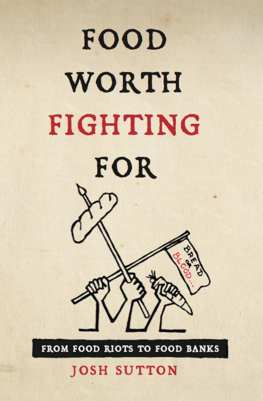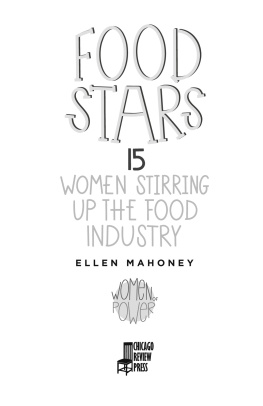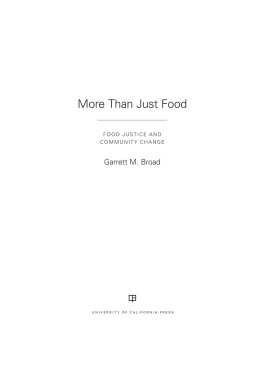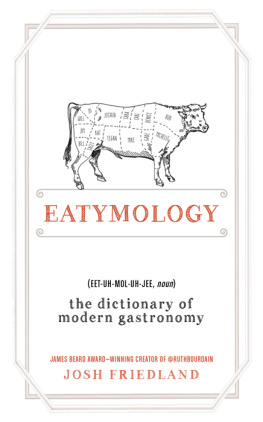As well as drawing on the works of eminent historians such as E.P. Thompson, Hobsbawm, Rud, Bohstedt, Sheldon and many others, I have used contemporary newspaper reports, local history groups and museums, together with folksong and ballad, to tell a tale of ordinary people doing extraordinary things. I clearly owe an enormous debt to those who have spent hours, days and years in meticulous research of their subjects. Ive included a detailed bibliography, which may help readers with further research, and goes some way towards acknowledging the debt that I owe.
Thanks are due also to The Guild of Food Writers for support with travel costs during the research of this book.
In terms of personal thanks, and there are many who have gone out of their way to assist me, I would like to thank: My father Alan and my wife Anne-Marie for reading numerous revisions along the way. I would also like to thank the following who all took valuable time out of their schedules, often going to great lengths to reply to my somewhat rudimentary questions in person; Professor John Bohstedt of the University of Tennessee, Dr Naomi Hossain of the Institute of Development Studies, Professor Graham Riches of the University of British Columbia, Dr Carl Griffin of the University of Sussex, Dr Nick Mansfield of the University of Central Lancashire, Natalie Joelle, City University London. I am also indebted to Ben Haldene, Manager of Bradford Food Bank, who was more than generous in giving up his time and provided me with a valuable insight into the workings of his operation. Tristram Stuart was kind enough to share his opinion and thoughts on my comparison of food rioters past with the efforts of the Gleaning Network today. I am also grateful to Lydia of the Leeds branch of Foodcycle, for her time taken in answering my questions. Gill Watson and Adam Smith were kind in laughing off my description of them both as food rioters. Peter Higginbotham kindly granted permission to reproduce his Ballad of Captain Swing, and Grahame Moore and Alan Battersby were also kind enough to provide much useful information regarding food protest recorded in ballad and song. I would also like to thank David Matthews for a pleasant afternoon spent discussing the Newlyn Fish Riots and the life of Davids ancestor William Oats Stricke. Boff Whalley has to be thanked for his cover design, and I am also grateful to Casey Orr for the author photograph. Both Tom Jaine and Dr Bryce Evans kindly presented me with the opportunity to air chapters of this book on an unsuspecting public, and for that I am most grateful. Finally, I am also hugely indebted to Geoff Tansey, both for his time spent one sunny morning discussing my project, but also for his work on the open resource Food Systems Academy (www.foodsystemsacademy.org.uk), a highly valuable resource for those interested in furthering their understanding of the nature of our food system.
It ought to go without saying, that while all of those above have helped me in my research, the views presented in this book are mine alone and do not necessarily reflect the opinions of those listed.
Some years ago, I worked as a labourer in deepest rural Wiltshire. My wages at the time were one hundred and seventy five pounds, and two rabbits per week. The rabbits werent written into my contract, I didnt even have a contract, but my boss insisted that I should benefit from his sideline of nocturnal pest control for the local farmers. Though the freezer at home was fast filling with rabbits (two rabbits per week is a lot for a young single fellow to get through), on the weeks that they werent available, I found I would miss them. It felt as though I had been short-changed; it was akin to having my wages docked. Compensation came, from time to time, with a nice bit of wild venison, which my boss had accidentally managed to shoot while out hunting rabbits, so things probably balanced out in the end. However, as well as teaching me the finer points of skinning, butchering and cooking Leporidae, this direct relationship with food left me with a lasting appreciation of the importance of its availability. Perhaps more importantly, it gave me an insight into the effect that a lack of available food can have on the morale of the village labourer.
It is through the plight of the village labourer, the fisherman, the The connotations of rioting went far beyond mere lawbreaking and opened up possibilities for celebration and revelry.
With over a million people dependent on food banks, and an all party parliamentary group (APPG) set up to examine food poverty and hunger in Britain in 2014, it struck me that todays food system is still failing a huge swathe of British society. How is it that school teachers in modern Britain can raise concerns about their pupils capacity to learn, because children are going to school hungry in the morning? How do we explain the explosion in the numbers of local and national charities, as well as individuals, offering food aid to the less well off in this country? Some of those concerns were reflected by the Bishop of Truro, Tim Thornton in the introduction to the report Feeding Britain, published by the APPG in December of 2014:
The issues people face relating to hunger and food poverty are exacerbated and highlighted because there are hardly any of the ways and means that once did exist for people to support each other. We believe that the rise in the use of food banks is a sign of the breakdown of this core value in our society.
And the Archbishop of Canterbury, Justin Welby, said in the Guardian in December 2015 that it was a tragedy that hunger still existed in the UK in the 21st century and he praised the work of charity food banks which he said were striving to make life bearable for people who are going hungry.
The leader of the church of England placed some of the blame for hunger on the government, singling out unnecessary problems caused by bureaucratic delays in welfare benefit payments and sanctions financial penalties imposed by job centres which left vulnerable claimants without money for food for weeks on end.
In an age where the vast majority of us carry out the weekly shop under one roof, we seem to have lost faith in the market place. Skips full of surplus food deliberately spoiled to prevent scavengers, the horsemeat scandal of 2013, and more recently the examples of creative accountancy at supermarket chain, Tesco, have shaken public confidence in our supermarkets. Yet rather than take to the streets to demand change, the majority of us continue to queue at the express checkout counter, tempted, and bought off with two-for-one offers and a price guarantee. Consumers and food producers alike, have become unsuspecting collateral damage in a never-ending supermarket price war as our food system has developed and grown, driven largely by commercial avarice. We have become casualties of a capitalist culture that undermines our right to food, a right which arguably dates back to the signing of the Magna Carta, and was more recently set out in the Universal Declaration of Human Rights in 1948. Our food system today has given rise to the paradox of soaring obesity rates, while others go hungry. Food poverty has hit the headlines. How can it be that a pint of milk can cost as little as 58p, yet families the length and breadth of Britain are referred to food banks on an almost daily basis?








